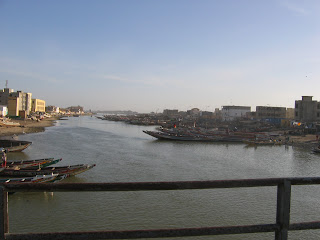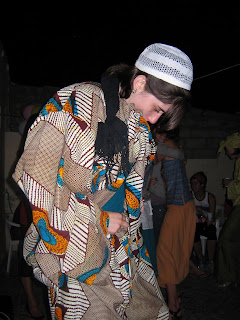
Anyway, it was awesome overall; I got to meet a ton of really cool people and explore St. Louis a little better than the last time we were there. One of the activities we had to do involved brainstorming in groups of 15 about different forms of conflicts and how to prevent/resolve them. When we got into groups the first line of order was to elect a president to oversee the activity and a reporter to act as a secretary and take notes of what everyone said. Of course the student in the 3-piece suit appointed himself President within the first 30 seconds, and it was all downhill from there. The rest of the men (ie almost everyone else in the room; the male to female ratio was about 8 to 1) spent the hour fighting to have their say, engaging in a competition to see who could use the most words to express the smallest amount of nothing.
The best part was that before we could even get to the questions, we would spend half an hour defining the terms in the question. This method of analysis was suggested, no, proposed, by a member of the committee who spent a solid 5 minutes explaining the idea and justifying it, pointing out the benefits of having solid definitions on which to base our brainstorming later. I’m sorry, but it’s brainstorming, for Pete’s sake, can we just get to it? What’s more, everyone insisted on introducing themselves, giving their nationality, major, school, major life accomplishments, favorite color etc before they made their comment, which interrupted the flow of the dialogue and was completely unnecessary in a room of 18 people wearing laminated nametags listing all of that information already (life accomplishments, and favorite color excepted). Suffice to say, the atmosphere was very formal. The fake-temporary president was addressed as “Mr/Ms President” and everyone requested his/her permission to speak… except when they interrupted each other politely to politely shut down someone else’s idea or politely suggest a change of topic. People seemed incapable of cutting to the chase even when they recognized the time limit. For example:
“Excuse me, [Introduction, Name, School etc] Thank you for hearing me out. I would just like to draw everyone’s attention to the time, because we’ve only answered the first two questions and we still have two more to complete and I do hope you haven’t forgotten that we only have one hour to answer all four of them. If you would look at your watches, you would see we only have 20 minutes left for the final questions. With Mr President’s permission, I would like to make a motion to move onto the next question, because as you can see, we’re almost out of time… …it’s only a suggestion.”
Inevitably, the next speaker would spend 5 minutes agreeing before actually moving on to the next question. The last day, a predominately male room decided that it would make them look really open-minded if they had a female president (their words, not mine). They stared at Kiersten and me. “No way.” I said. I’d been watching them stomp all over the President’s fake authority all weekend, challenging him, politely suggesting he wasn’t doing his job. Now they wanted to make themselves look good by forcing a girl to be the figurehead for their little testosterone party. “You can’t make us be president.” We said. They insisted. We argued for about five minutes before Kiersten gave up, “Fine, if you want a bad president, I’ll do it!” They cheered and we looked at each other incredulously. But she wasn’t a bad president- she was a frickin’ awesome president. The boys didn’t feel like they had to challenge her authority because Kiersten didn’t wave it over their heads like the previous presidents had. And when they got too long winded she told them, “Listen, can you cut to the chase? Because you’re repeating what the other guy said.” “Yeah, I’m getting there.” “Well, get there now.” “Yeah, I’m almost there.” “No, just say it! Get there now!” Although she may have been appointed for the wrong reasons, she was the best president we had all weekend.
Well, I don’t know where I was going with this. Mostly, I think it says something about conferences and committee work in general; it’s the same all over the world. I recognized all the same type-A leader personalities that I’d worked with on committees in the States. I was surprised at all the similarities.

 The kicker was that after 3 days of peace talks, we were supposed to have a Lutte between two of the participating schools. It never happened, but I’ll get to that in a minute. First, Senegalese lutte (literally: fight) called “làmb” in Wolof, is Senegal’s national sport. It is the only sport, apart from soccer that is ever shown on TV. I’ve seen a few luttes live, and it’s usually pretty exciting for about the first hour and a half and then I’m just tired but can’t sleep because everyone keeps trying to get me to dance.
The kicker was that after 3 days of peace talks, we were supposed to have a Lutte between two of the participating schools. It never happened, but I’ll get to that in a minute. First, Senegalese lutte (literally: fight) called “làmb” in Wolof, is Senegal’s national sport. It is the only sport, apart from soccer that is ever shown on TV. I’ve seen a few luttes live, and it’s usually pretty exciting for about the first hour and a half and then I’m just tired but can’t sleep because everyone keeps trying to get me to dance.The first weekend we were in Senegal, the study abroad program set up a trip to the big stadium in Dakar to watch traditional lutte. Unfortunately, no one had explained the rules, or even really what it was, and there was so much else going on in the way of singing and dancing on the field that I missed the first two matches before I realized they had started. Also, we were pretty jet-lagged and the whole ordeal lasted about 4 hours.
It’s played like this; two giant fighters square off, paw at each other’s arms for anywhere between 10 seconds and 4 minutes and then one of them makes a move to bring the other one down. The point is to get your opponent on all fours or lower- or on their back. Essentially it comes down to balance. You don’t have to pin them there for longer than a millisecond, you just have to get them down by any means possible; flip them, push them, pull them, trip them. Frequently they end up in this never-ending-mutual-headlock-of-doom, connected by the shoulders, bent over 90 degrees with their butts in the air, like some weird two-ended animal, trying to pull each other off balance. Some of the meaner ones will punch or tap on their opponent’s head, but mostly it’s wrestling standing up. It takes place in an arena of sand, and if one of them steps out of bounds, they have to start over.
The really interesting part is everything that happens before the lutte. The drumming begins before the fighters even show up and continues until everyone leaves. These guys have stamina, as do the singers, usually a group of 3 or more women, one singing the lead and the rest backing her up as they repeat the same refrain over and over. The music blares out over large speakers and the MC struggles with a temperamental microphone throughout the night. Fighters strut around the ring, dancing their warrior dance with two lines of 5 or 6 men behind them (back up dancers). They dance in front of the drummers grinning fiercely. Before the battle, many different rituals must be carried out. The fighter strips down to his lutte attire; what looks like a giant diaper. He is also adorned with many ‘gree-grees’ which are talismans and charms of sorts, tied around his arms, ankles, back, waist. Some are shoved into his diaper. Milk is poured over his head, and he makes a last-minute call to his Marabout**. The Marabout gives the fighter instructions about how to win. There are more traditions that I don’t really understand involving burying things, pouring water in the sand, etc, but the essential is that they all are supposed to help them win.
When I first got to Senegal I thought I was going to hate this sport. I was frustrated with all the build up; the dancing and singing and rituals all last forever while the actual match itself might be over in 20 seconds. But having been here for almost 5 months, I’m in love with it. What am I going to do when I go home this summer and it’s not on TV every night? Ginger and I were trying to lutte on the beach yesterday, and it’s harder than it looks.
Anyway, I was kind of bummed when we didn’t get to watch a lutte at the conference. It was supposed to happen. We showed up at the University in St. Louis in the evening around 8pm. They’d set up chairs and benches and a big street-lamp type light illuminated the arena. The drummers were set up, and we danced on and off for an hour, stomping our feet and wiggling our knees, opening and closing our legs, shaking our butts (Senegalese dancing is also harder than it looks). It was a lot of fun, and I was thinking that it was probably one of the last times I’d have the opportunity. But then we got tired. The fighters had shown up and some were strutting around like they were getting ready. The women had been singing for a few hours. Nothing. A large group of people, referees, peace conference coordinators, fighters were talking just behind the arena. Finally, the conference director came over to us. “Everyone back on the bus, we’re going back to the hotel.” What? We couldn’t tell if he was kidding. He wasn’t. Later, we found out that the St. Louis team had tried to enter a fighter in the competition who wasn’t a student. Apparently the same fighter had helped them win the last time and the Dakar team was fed up. There was a cash prize for the winning team and with money on the line, they couldn’t come to an agreement and we had to abort the whole plan. On the bus ride back to the hotel everyone was complaining, suggesting solutions. I smiled. Conflict resolution is complicated and you can’t always get what you want.
** Islamic religious leader by heritage who, in this case, tells the future, makes amulets, and survives on 'donations' in return for prayers and blessings.




























